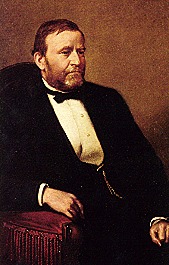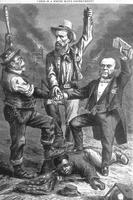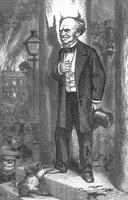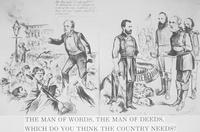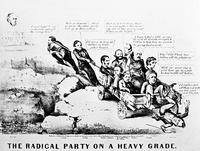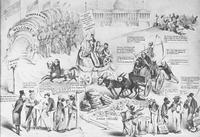1868
| Candidate |
Popular
|
Electoral
|
| Ulysses S. Grant Republican |
3,013,650
|
214
|
| Horatio Seymour Democrat |
2,708,744
|
80
|
| Ulysses S. Grant, official White House portrait (public domain) |
The country's financial situation and reconstruction were the issues in 1868. The Republican candidate, Ulysses S. Grant, popular as the "strong silent man who saved the Union," took no stand on the economy, but he did come out in favor of compulsory Negro suffrage in the South (21A-1066970). His opponent, Horatio Seymour, whose party favored the payment of war debts in paper money, evaded the issue.
As we see here, America's most influential cartoonist, Thomas Nast of Harper's Weekly, was beginning to wield the power of his pen. He attacked the Democrats for racism in this cartoon (21B-1066971). These cartoons were based on the rumor that Seymour had addressed an angry crowd of rioters as "my friends." (21C-1066972, 21D-1066973) The crowd was actually orderly, the disturbance three miles away, and Seymour did urge the crowd to be peaceful, but as we see, cartoonists were quick to capitalize on the rumor. Others saw Seymour as the "sun rising in the East," illuminating Grant's difficulties in getting to the White House (21E-1066974). However, these difficulties did not prevent Grant from winning the presidency with a comfortable margin (21F-1066975).


